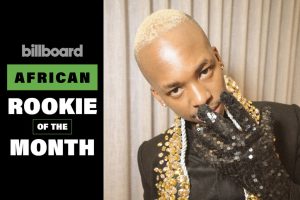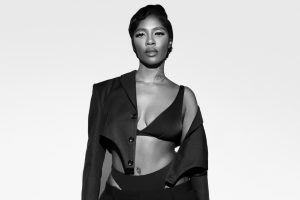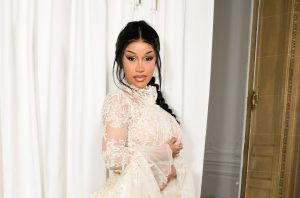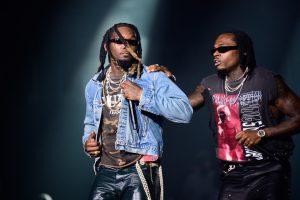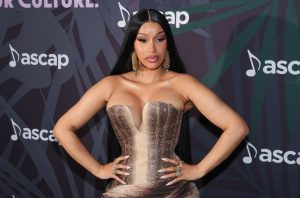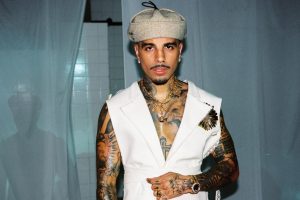Tiwa Savage, often hailed as the Queen of Afrobeats, is stepping into a bold new chapter with her debut R&B album, This One Is Personal. Over two years, she poured her heartbreak, growth and resilience into a deeply emotional project that blends smooth R&B vibes with her Afrobeats roots. Explore See latest videos, charts and news Recorded across Nashville, London and Lagos, the album takes listeners on a journey through heartbreak, healing, and self-discovery. With live instrumentation and a vulnerability she’s rarely shared, this is Tiwa Savage like you’ve never heard her before. Billboard talked to Tiwa about what makes this album so personal, how London and Lagos shaped her sound, her love for classic R&B, balancing Afrobeats with vulnerability, collaborating with Skepta, and what heartbreak and success look like to her right now. You’ve been crowned the “Queen of Afrobeats” for years — but now you’re stepping into R&B with This One Is Personal. What made now the right time to make this transition? I think I’ve always shown that R&B, or rhythm and blues, soul type of music, was really the anchor of how I got into music. I’ve always said I was gonna go back to doing this type of genre fully, with my full chest, ’cause I’ve dabbled in it a few times with my other projects. But I went through a really hard breakup, and it was during the time that I was due to record this project. It just felt like the right time for me to pour out my heart, and this genre was the only way I could really express myself musically with what was going on in my life at the time. So it just felt like the right time. It felt like I was heartbroken into it. The title itself, This One Is Personal, suggests intimacy. What does “personal” mean for you in this moment of your career? It means letting the fans see a more vulnerable side of me. They’re used to seeing the African bad girl, the sassy, very confident woman — but this time around I’m allowing them to really see me in my really vulnerable state, in my true form. Even on social media, I do a lot of content where I’m not wearing any makeup and I’m just speaking directly to the camera, letting them see that side of me. This part of my career, this part of my life, is very personal, and I’m letting the fans see that side. You’ve just moved back to England. How has being back in London influenced the way you approached this album? I spent a long time in the UK growing up. It was actually in London that I really fell in love with music, when I first got introduced to soul and R&B. Going back to London was a full-circle moment for me recording this album, because it felt like home. Nigeria will always be home, but the U.K. is also like a second home for me. To be honest, I recorded this album in different places — Nashville, San Fran, Malibu, Nigeria, and London. But the U.K. was a full circle moment, because that’s where I first fell in love with music. R&B has always been a love of yours — you’ve mentioned Brandy, Tamia, and 90s R&B as key influences. How did those inspirations shape the sound of this project? Oh, you’ll hear the nostalgia on a lot of songs on the album. Even just in the vocal layering and harmonies, especially the layering. The intro to my second single with Skepta, “On the Low,” really gives an ode to Brandy. Her vocal layering is just impeccable, and that was me paying homage to her. Lyrically, you’re going to hear all the influences across this project. The first single, “You 4 Me,” samples Tamia’s “So Into You.” Why was that song the right one to reimagine for this album? There were so many, but that one… I don’t think there’s anybody that hates that record. It’s just one of those records you put on, it feels like summer, like barbecues, cookouts, parties. It just feels amazing. Like everybody else, I’ve always loved that record, and it was such an honor for me to sample it. It just felt right. I’ve always loved it, and I was so honored that I was able to use it and that the sample was cleared for me. Which version do you prefer? The one with Fab or the original? The one with Fab — there’s just something about that one, man. I mean, the original is the original, but the one with Fabolous is just… ooh, that one. There’s not much difference, though. I don’t know, there’s just something about the way he comes in. It’s incredible. “I’m Done” is such a raw and emotional track — I heard you even had to stop recording to cry. How important was it for you to allow that kind of vulnerability into your music? Initially, we weren’t gonna use that song. It was off the project because I felt like it was too much, too deep. I wasn’t sure if it was too personal for anyone else to connect with. Eventually, the more we talked about the project and the songs that were gonna make it, everybody was like, this song has to make it, and it has to be the first song. It sets the pace for what I’ve been going through. Initially, it was hard for me to include it. Even now, when I listen to my project, sometimes I have to skip it because it takes me to a certain place that’s still really deep… But I’m so happy so many people are connecting to it. Even though it was so personal, they’re able to relate. So many people hit me up saying that record hits them so hard. I’m so thankful I put it in the project. Afrobeats is still at the heart of your artistry. How did you





